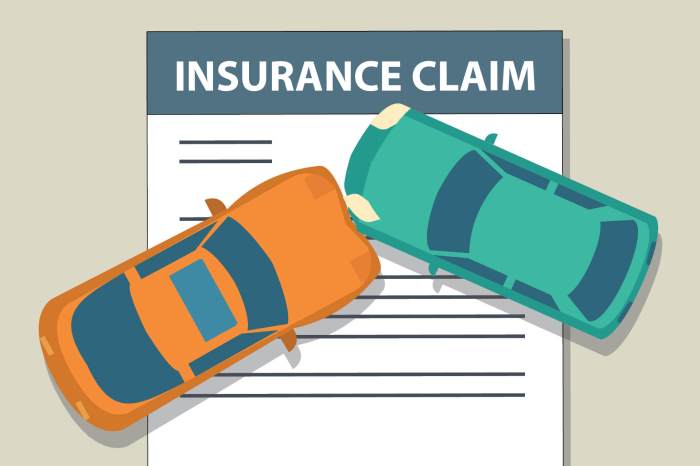
How to sue car insurance company – So, you’ve been in a car accident and your insurance company isn’t playing fair? You’re not alone. Sometimes, insurance companies try to lowball you, deny your claim, or just plain drag their feet. If you feel like you’ve been wronged, you might be wondering, “Can I sue my car insurance company?” The answer, in many cases, is a resounding yes! This guide will walk you through the process of taking legal action against your car insurance company, from understanding your policy to navigating the courtroom.
Suing your insurance company isn’t something you should take lightly. It can be a long, complicated, and expensive process. But if you’ve been treated unfairly, it might be your only option to get the compensation you deserve. This guide will help you understand your rights, gather the evidence you need, and choose the right legal representation to fight for your case.
Understanding Your Insurance Policy
You’ve probably heard the phrase “know your rights,” but have you ever considered “know your policy”? Your car insurance policy is your contract with the insurance company, and it’s crucial to understand the fine print. It’s your guide to what’s covered, how much you’re covered for, and what your responsibilities are.
Types of Coverage
Your car insurance policy likely includes several types of coverage, each designed to protect you in different situations. Knowing what each type covers will help you make informed decisions about your policy.
- Liability Coverage: This is the most common type of coverage, and it protects you financially if you cause an accident that injures someone or damages their property. It covers the other driver’s medical bills, lost wages, and property damage.
- Collision Coverage: This coverage pays for repairs or replacement of your car if it’s damaged in an accident, regardless of who’s at fault.
- Comprehensive Coverage: This coverage protects your car from damage caused by events other than accidents, such as theft, vandalism, or natural disasters.
- Uninsured/Underinsured Motorist Coverage: This coverage protects you if you’re injured in an accident caused by a driver who doesn’t have insurance or doesn’t have enough insurance to cover your losses.
- Personal Injury Protection (PIP): This coverage pays for your medical expenses, lost wages, and other related costs, regardless of who caused the accident.
Reviewing Your Policy
Now that you know the different types of coverage, it’s time to dive into your policy and see what you’re covered for. Don’t just skim it; read it carefully, especially the sections about claims and legal proceedings. Here are some things to look for:
- Deductibles: This is the amount you pay out-of-pocket before your insurance kicks in. The higher your deductible, the lower your premium, but you’ll pay more in the event of a claim.
- Limits: Your policy will have limits on the amount of coverage you have for each type of coverage. For example, your liability coverage may have a limit of $100,000 per person and $300,000 per accident.
- Exclusions: These are specific situations or events that are not covered by your policy. For example, your policy may exclude coverage for damage caused by driving under the influence of alcohol or drugs.
- Claims Process: This section explains how to file a claim, what documentation you need, and the process for resolving disputes.
- Legal Proceedings: This section may Artikel your rights and responsibilities if you need to file a lawsuit against the insurance company.
The Claims Process
Filing a claim with your insurance company can be a stressful experience, but it doesn’t have to be a nightmare. Understanding the process can help you navigate it smoothly.
- Report the Accident: Immediately after an accident, contact your insurance company and report the details. They will provide you with a claim number and instructions on what to do next.
- Gather Documentation: You’ll need to provide your insurance company with documentation to support your claim. This may include:
- Police report
- Photos of the damage
- Medical bills
- Repair estimates
- Witness statements
- Submit Your Claim: Once you have gathered all the necessary documentation, submit your claim to your insurance company.
- Review the Settlement: Your insurance company will review your claim and offer a settlement. If you disagree with the settlement, you can negotiate with them or file a lawsuit.
Determining if You Have a Valid Claim
You’ve been in an accident, and you’re ready to file a claim with your insurance company. But what if they deny your claim or offer you a settlement that’s way lower than what you deserve? That’s when you might need to consider taking legal action.
Before you sue your car insurance company, you need to understand the circumstances under which your claim might be valid. This involves carefully reviewing your insurance policy and understanding your rights as an insured individual.
Common Scenarios Where Suing Might Be Necessary
Suing a car insurance company is a serious decision, but sometimes it’s the only way to get the compensation you deserve. Here are some scenarios where you might need to consider taking legal action:
- Your insurance company is denying your claim without a valid reason. Imagine your car was totaled in an accident that wasn’t your fault, but your insurance company claims it was. They might be trying to avoid paying out on your policy, and you might need to sue to get them to pay up.
- Your insurance company is offering you a lowball settlement. They might offer you a settlement that doesn’t cover your medical bills, lost wages, or the full cost of repairing or replacing your car. This is especially common if you have pre-existing conditions, and the insurance company tries to claim your injuries were caused by those conditions, not the accident.
- Your insurance company is acting in bad faith. This could involve things like delaying the claims process, failing to investigate your claim properly, or refusing to negotiate in good faith. If your insurance company is acting in bad faith, you might have grounds to sue them.
Examples of Bad Faith Actions
Insurance companies are obligated to act in good faith when handling claims. Here are some examples of how they might be acting in bad faith:
- Delaying the claims process. Your insurance company might take a long time to process your claim, forcing you to wait weeks or even months for compensation. This can be especially difficult if you’re injured and need to pay medical bills.
- Failing to investigate your claim properly. Your insurance company might refuse to investigate your claim or might conduct a superficial investigation that doesn’t take into account all the relevant facts. This can lead to a denial of your claim, even if you’re entitled to compensation.
- Refusing to negotiate in good faith. Your insurance company might refuse to negotiate a fair settlement with you, even if you’re willing to compromise. This can be frustrating and stressful, especially if you’re trying to resolve the matter without going to court.
Legal Basis for Suing a Car Insurance Company
The legal basis for suing a car insurance company depends on the specific laws in your state. However, most states have laws that require insurance companies to act in good faith when handling claims. These laws can provide grounds for a lawsuit if the insurance company is acting in bad faith or denying a legitimate claim.
- Breach of Contract. Your insurance policy is a contract between you and your insurance company. If your insurance company fails to fulfill its obligations under the contract, you might have grounds to sue for breach of contract. For example, if your policy covers certain types of accidents, but your insurance company denies your claim based on a technicality, you might be able to sue for breach of contract.
- Bad Faith. Most states have laws that prohibit insurance companies from acting in bad faith when handling claims. If your insurance company is acting in bad faith, you might be able to sue them under these laws. This can include situations where the insurance company is deliberately delaying your claim, refusing to investigate your claim properly, or offering you a lowball settlement.
Important Considerations
Remember, suing a car insurance company is a serious decision. It can be a long and expensive process. Before you file a lawsuit, you should consult with an experienced attorney to discuss your options and understand the potential risks and rewards. An attorney can help you determine whether you have a valid claim and can advise you on the best course of action.
Gathering Evidence and Documentation
You’ve got a claim, and you’re ready to take on the insurance company. But before you go charging into battle, you need to arm yourself with the right weapons: evidence. Think of it like a courtroom drama, except instead of a lawyer, you’re the star witness, and your evidence is your ammunition.
Gathering evidence is crucial for building a strong case. It helps you paint a clear picture of what happened, proving the insurance company’s responsibility and the extent of your damages. This evidence will be your guide, leading you to the payout you deserve.
Documenting the Accident
Documenting the accident scene is like capturing a crime scene in a movie. You’re not just taking photos for Instagram; you’re creating a visual record of the incident.
- Photos: Snap pictures of everything – the damage to your car, any skid marks, traffic signs, and the surrounding area. Don’t forget to get shots of the other vehicle involved, too. Remember, you’re building a case, not just taking selfies.
- Witness Statements: If anyone saw the accident, get their contact information and a written statement. They’re like your backup singers, providing additional evidence to support your story.
- Police Report: The police report is like a court transcript, providing an official account of the incident. It’s a must-have for any claim, so be sure to get a copy.
Gathering Key Documents
You’re not just going to waltz into court with a photo album; you need the right paperwork to back up your case.
- Medical Records: Your medical records are your proof of injury. Make sure you have copies of all your medical bills, treatment plans, and doctor’s notes. This is like showing the jury your battle scars.
- Vehicle Repair Estimates: This is your damage report, showing the insurance company how much it will cost to fix your car. Get estimates from reputable repair shops, not just your uncle’s garage.
- Lost Wage Statements: If you missed work because of the accident, you’ll need to document your lost wages. This is like showing the jury your missed paychecks.
- Insurance Policy: Don’t forget your own insurance policy. It’s like the playbook for your case, outlining your coverage and rights.
Expert Opinions and Reports
Sometimes, you need more than just photos and paperwork. You need the expert opinions of professionals.
- Accident Reconstruction: If the cause of the accident is complex, you may need an expert to reconstruct the scene. They’re like forensic detectives, using scientific methods to determine how the accident happened.
- Medical Evaluations: If your injuries are severe, you may need a medical expert to evaluate your condition. They can help determine the long-term impact of your injuries and the cost of future treatment.
Choosing the Right Legal Representation

You’ve gathered your evidence, and you’re ready to take the next step. But before you file a lawsuit, you need to consider whether hiring an attorney is right for you.
An experienced attorney specializing in insurance law can be a valuable asset in your fight for fair compensation. They have the knowledge and expertise to navigate the complex legal system and negotiate with insurance companies on your behalf.
Types of Legal Representation
Choosing the right type of legal representation is crucial. Consider your specific needs and the complexity of your case.
- Personal Injury Lawyers: These attorneys specialize in cases involving physical injuries, such as car accidents, slip and falls, and medical malpractice. They have experience dealing with insurance companies and can help you recover damages for your injuries, lost wages, and pain and suffering.
- Insurance Claims Specialists: These professionals focus on helping individuals navigate the insurance claims process. They can assist with filing claims, understanding policy terms, and negotiating settlements. They may not have the same legal expertise as a personal injury lawyer but can be valuable resources for individuals with less complex claims.
Finding and Evaluating Potential Legal Representation
Finding the right attorney can feel overwhelming. Here are some tips to help you find and evaluate potential legal representation:
- Ask for Referrals: Talk to friends, family, and colleagues who have experience with insurance claims or personal injury lawsuits.
- Check Online Directories: Websites like Avvo and FindLaw allow you to search for attorneys by specialty, location, and client reviews.
- Contact Your State Bar Association: State bar associations often have resources for finding qualified attorneys.
- Schedule Consultations: Meet with several attorneys to discuss your case and get a feel for their experience, communication style, and fees.
Evaluating Potential Legal Representation
When evaluating potential legal representation, ask these questions:
- What is their experience with insurance claims and lawsuits similar to mine?
- What is their track record of success?
- How will they communicate with me throughout the process?
- What are their fees and payment options?
Negotiating with the Insurance Company
You’ve done the groundwork, gathered the evidence, and maybe even hired a lawyer. Now comes the big showdown: negotiating with the insurance company. This stage is where you fight for the compensation you deserve. But remember, insurance companies are businesses, and their bottom line is profit. They’ll try to pay as little as possible, so knowing your rights and negotiating effectively is crucial.
Understanding Your Rights
Before you even start talking to the insurance company, you need to understand your rights as a policyholder. This includes knowing the terms of your policy, what benefits you’re entitled to, and the process for filing a claim. You also need to be aware of state laws that protect your rights as a policyholder.
Communicating with Insurance Adjusters
The insurance adjuster is the person who evaluates your claim and decides how much the company will pay. Here’s how to handle communication with them:
* Be polite but firm. You’re not asking for a favor, you’re demanding what you’re owed.
* Document everything. Keep detailed records of all conversations, including dates, times, and the adjuster’s name.
* Be prepared to provide evidence. Have your documentation ready, including photos, police reports, medical bills, and repair estimates.
* Don’t accept the first offer. Insurance adjusters often start with a lowball offer. Don’t be afraid to negotiate.
* Don’t agree to anything in writing without consulting your lawyer. This is crucial, especially if you’re not sure about the offer.
Handling Settlement Offers
When the insurance company makes a settlement offer, take your time. Don’t rush into a decision. Consider these factors:
* Is the offer fair? Compare the offer to your estimated damages and the value of your claim.
* Are there any hidden strings attached? Read the fine print carefully.
* Is the offer in your best interest? If you’re unsure, consult your lawyer.
Consequences of Accepting a Settlement Offer Without Legal Counsel
If you accept a settlement offer without consulting a lawyer, you may be giving up your right to appeal the decision later. Here’s why:
* You may not fully understand the terms of the settlement. A lawyer can help you understand the legal jargon and make sure you’re not giving up any rights.
* The settlement may not cover all your damages. A lawyer can help you negotiate a settlement that covers all your losses, including medical expenses, lost wages, and pain and suffering.
* You may not be aware of other legal options. A lawyer can help you explore all your legal options and make sure you’re getting the best possible outcome.
Filing a Lawsuit: How To Sue Car Insurance Company
Okay, so you’ve tried everything else, and the insurance company is still giving you the runaround. You’re feeling frustrated, maybe even a little angry, and you’re ready to take things to the next level. That’s where filing a lawsuit comes in. It’s not a decision to be taken lightly, but it might be the only way to get the compensation you deserve.
Steps Involved in Filing a Lawsuit
Filing a lawsuit is a formal legal process. It involves several steps, and it’s important to understand each one. Here’s the basic rundown:
Drafting a Complaint
This is your first move, and it’s basically a legal document that Artikels your case. It’s like a formal letter to the court, explaining why you’re suing the insurance company and what you want them to do. It’s important to get this right, so you’ll need to include specific details about the accident, your injuries, and the insurance company’s refusal to pay. You can either hire a lawyer to draft the complaint for you, or you can try to do it yourself. But be warned, legal jargon can be tricky!
Serving the Defendant
Once you’ve drafted the complaint, you need to officially deliver it to the insurance company. This is called “serving” the defendant. A court official, like a sheriff, will usually handle this, and it’s a crucial step because it formally notifies the insurance company that they’re being sued.
Types of Lawsuits
There are a few different types of lawsuits you can file against an insurance company. The most common ones are:
Breach of Contract
This type of lawsuit is filed when you believe the insurance company has violated the terms of your insurance policy. For example, if you have collision coverage, but the insurance company refuses to pay for repairs after an accident, you might have a breach of contract claim.
Bad Faith Claims
These lawsuits are filed when you believe the insurance company has acted in bad faith, which means they’ve deliberately tried to avoid paying your claim. Examples include:
- Denying your claim without a valid reason
- Delaying your claim without a valid reason
- Failing to investigate your claim properly
Costs and Timelines
It’s important to understand that filing a lawsuit can be expensive. You’ll need to pay filing fees, court costs, and possibly legal fees if you hire a lawyer. The amount of time it takes to resolve a lawsuit can also vary depending on the complexity of the case and the court’s schedule. It’s important to be prepared for a long process, which can last months or even years.
Preparing for Trial

Okay, so you’ve done all the prep work, you’ve got your evidence, and you’re ready to take on the insurance company. But before you step into the courtroom, there’s one more crucial step: getting ready for trial. Think of it like prepping for a big game – you gotta know the plays, practice your moves, and be ready for anything the other team throws at you.
Discovery and Evidence Exchange
In the legal world, discovery is like a big information exchange. Both sides get to ask questions, request documents, and even take depositions (sworn statements) from the other side’s witnesses. This process helps everyone understand the facts of the case and gather evidence. It’s like a giant game of “Truth or Dare,” but with lawyers instead of teenagers.
Remember, discovery is your chance to find out what the insurance company’s strategy is and to see if they have any weaknesses in their case.
Types of Evidence, How to sue car insurance company
Now, let’s talk about what kind of evidence you can use at trial. It’s like putting together a puzzle, but instead of pictures, you’re using different types of evidence to tell your story:
- Witness Testimony: This is like having your friends and family come to court to tell their side of the story. They can talk about what they saw, heard, or experienced related to your case. Think of it like a courtroom version of “he said, she said.”
- Documents: These are like the receipts, bills, and reports that support your claim. Think of it like the “paper trail” that backs up your story.
- Expert Opinions: Sometimes you need a professional to explain the technical stuff, like a doctor explaining your injuries or an engineer explaining how the accident happened. This is like bringing in a “superhero” to explain the complicated parts of your case.
Preparing for Trial
Okay, so you’ve got your evidence ready, but now it’s time to practice your moves. Here’s how to get ready for trial:
- Practice Witness Testimony: Just like athletes practice their plays, your witnesses need to practice their testimony. This helps them feel confident and prepared when they’re on the stand. Think of it like a “dress rehearsal” for the courtroom.
- Develop a Trial Strategy: Your lawyer will work with you to create a plan for how to present your case. This includes deciding what evidence to use, how to present it, and what arguments to make. It’s like having a “game plan” for the courtroom.
Wrap-Up

Navigating the legal system can be intimidating, but it’s important to remember that you have rights. If you feel like your insurance company is treating you unfairly, don’t be afraid to stand up for yourself. By understanding your policy, gathering evidence, and seeking the right legal counsel, you can increase your chances of getting the justice and compensation you deserve.
Query Resolution
What are the most common reasons people sue their car insurance companies?
People often sue their car insurance companies for reasons like: denial of legitimate claims, unfair settlement offers, bad faith practices, and failure to pay benefits.
How much does it cost to sue a car insurance company?
The cost of suing a car insurance company can vary widely depending on the complexity of the case, the location, and the chosen legal representation. It’s important to consult with an attorney to understand the potential costs involved.
What happens if I lose my lawsuit against the car insurance company?
If you lose your lawsuit, you may be responsible for paying the insurance company’s legal fees and costs. It’s important to weigh the risks and benefits of filing a lawsuit before making a decision.
How long does it take to sue a car insurance company?
The length of a lawsuit can vary greatly. Some cases may be resolved quickly through negotiation, while others may take years to go through the entire legal process.





